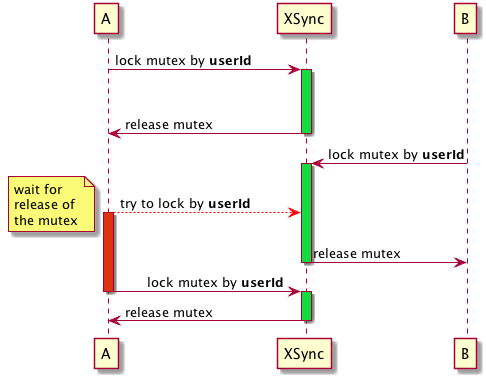XSync is a thread-safe mutex factory, that provide ability to synchronize by the value of the object(not by the object).
And you can use it for all type of objects which you need.
You can read more about this library here: Synchronized by the value of the object
You need to add the next dependencies:
<dependency>
<groupId>com.antkorwin</groupId>
<artifactId>xsync</artifactId>
<version>1.3</version>
</dependency>You can create XSync instances parametrized by the type of key which you need. For example we create two XSync instances for Integer and String keys and made it as Spring beans:
@Configuration
public class XSyncConfig {
@Bean
public XSync<Integer> intXSync(){
return new XSync<>();
}
@Bean
public XSync<String> xSync(){
return new XSync<>();
}
}@Autowired
private XSync<String> xSync;
@Test
public void testLock() throws InterruptedException {
// Arrange
NonAtomicInt variable = new NonAtomicInt(0);
ExecutorService executorService = Executors.newFixedThreadPool(10);
// Act
executorService.submit(() -> {
System.out.println("firstThread started.");
xSync.execute(new String("key"), () -> {
System.out.println("firstThread took a lock");
sleep(2);
variable.increment();
System.out.println("firstThread released a look");
});
});
executorService.submit(() -> {
sleep(1);
System.out.println("secondThread started.");
xSync.execute(new String("key"), () -> {
System.out.println("secondThread took a lock");
// Assert
Assertions.assertThat(variable.getValue()).isEqualTo(1);
sleep(1);
variable.increment();
System.out.println("secondThread released a look");
});
});
executorService.awaitTermination(5, TimeUnit.SECONDS);
// Assert
Assertions.assertThat(variable.getValue()).isEqualTo(2);
} Result of this test:
You can read more details about this example in my article: Synchronized by the value of the object
A business logic, that we need to synchronize:
public class PaymentService {
...
@Autowired
private XSync<UUID> xSync;
public void withdrawMoney(UUID userId, int amountOfMoney) {
xSync.execute(userId, () -> {
Result result = externalCashBackService.evaluateCashBack(userId, amountOfMoney);
accountService.transfer(userId, amountOfMoney + result.getCashBackAmount());
externalCashBackService.cashBackComplete(userId, result.getCashBackAmount());
});
}
}And places of usages:
public void threadA() {
paymentService.withdrawMoney(UUID.fromString("11111111-2222-3333-4444-555555555555"), 1000);
}
public void threadB() {
paymentService.withdrawMoney(UUID.fromString("11111111-2222-3333-4444-555555555555"), 5000);
}You can find a project with examples here: github.com/antkorwin/xsync-example
XSync is Open Source Software released under the Apache 2.0 license.

